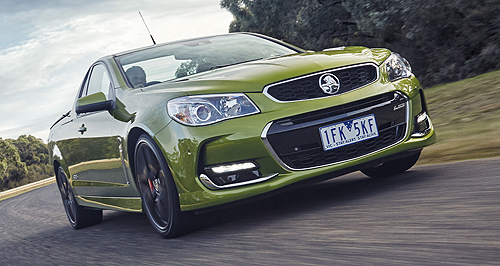Make / Model Search
News - VFACTS - Sales 2019VFACTS: The Aussie car is no moreGone, not forgotten: Holden’s locally made cars were once a dominant force of the local market, but now have slipped into history. Zero Australian-made car sales in May marks the end of a golden era5 Jun 2019 FOR the first time in more than 70 years, no Australian-built cars were sold in the local market last month.
Holden, which has been running out remnants of its locally built Commodore sedan and ute range since production stopped in October 2017, finally appears to have cleared the stock, recording zero sales of locally sourced vehicles last month, according to official VFACTS sales figures for May.
The GM subsidiary had sold 43 locally manufactured cars in the four months prior to that, becoming the last of the ‘big three’ Australian manufacturers to trouble the scorer.
Both Toyota and Ford had already cleared away discontinued local models by the end of last year, moving on to a fully imported line-up.
The Australian-made car has been a fixture of the local market since 1948 when the first true-blue Holden rolled off the Fishermans Bend production line in Victoria.
The biggest source of vehicles in Australia now is Japan which supplied almost a third of the cars and trucks sold locally last month. It is followed by Thailand – source of most of the popular pick-ups that top the sales these days – on 22,979 units.
Ironically, Holden’s shift to 100 per cent imports came in a month when it appears to have slowed its rapid decline down the sales ladder, recording a drop of ‘just’ 14.4 per cent in May on the same month last year and a 21.9 per cent slump year to date.
However, its May tally of 4392 units was sufficient to help it cling to a top 10 position, in eighth place behind Volkswagen, while its Colorado ute sneaked into 10th place on the top-selling vehicle chart.
The overall Australian new-vehicle market continued its 2019 slide, with May sales down 8.1 per cent, exactly in line with the year-to-date decline after five months.
All major vehicle segments and all states were in negative territory as the market managed 92,561 sales compared with 100,754 for the corresponding month last year.
Federal Chamber of Automotive Industries chief executive Tony Weber said his organisation hoped the market would improve over the next few months.
“We have attributed this trend to known market factors such as an economic downturn, drought, political events, the tightening of financial lending and lack of confidence in the market,” he said.
“Now that the Federal election has been finalised, we are optimistic that the market will improve over the next few months.”
Toyota was again the sales champion in May, delivering 18,820 vehicles – a drop of 3.8 per cent – and landing four of its popular models in the top 10. Its HiLux ute was again the best seller, with 4206 sales last month, ahead of Ford’s similar Ranger (3972).
Runners up Mazda (8578) and Hyundai (8106) both record sales decline roughly in line with the market (8.8 and 8.0 per cent respectively), but Ford and Kia both managed to hold their own with 5788 and 5533 sales to take fourth and fifth positions.
The biggest hit for the month was Mitsubishi which, after riding high over the past year or two, took a 26 per cent tumble, to 5120 sales.
The Japanese marque’s two biggest sellers, the Triton and ute and ASX small SUV, was responsible for most of this decline, with ASX sales falling by almost half and the Triton 4x4 down 36.8 per cent.
Steady Subaru “did a Bradbury” to regain a place in the top 10 by maintaining sales at 4203 units, putting it in ninth place ahead of Nissan (3970, -8.4) and pushing Honda out to 11th spot.
In the luxury car segment, Audi took a big hit – down 36.4 per cent to 1177 units in May – to trail rivals Mercedes-Benz (2621, -9.6) and BMW (2052, -2.3).
 Read more |
Click to shareVFACTS articlesResearch VFACTS Motor industry news |












Facebook Twitter Instagram